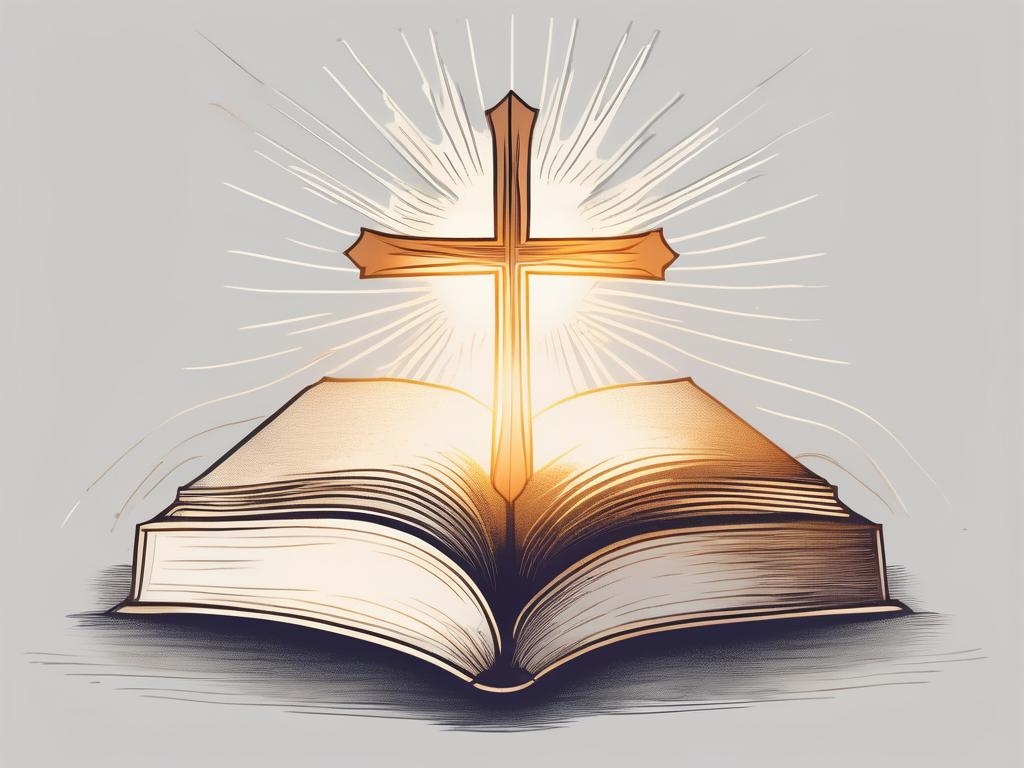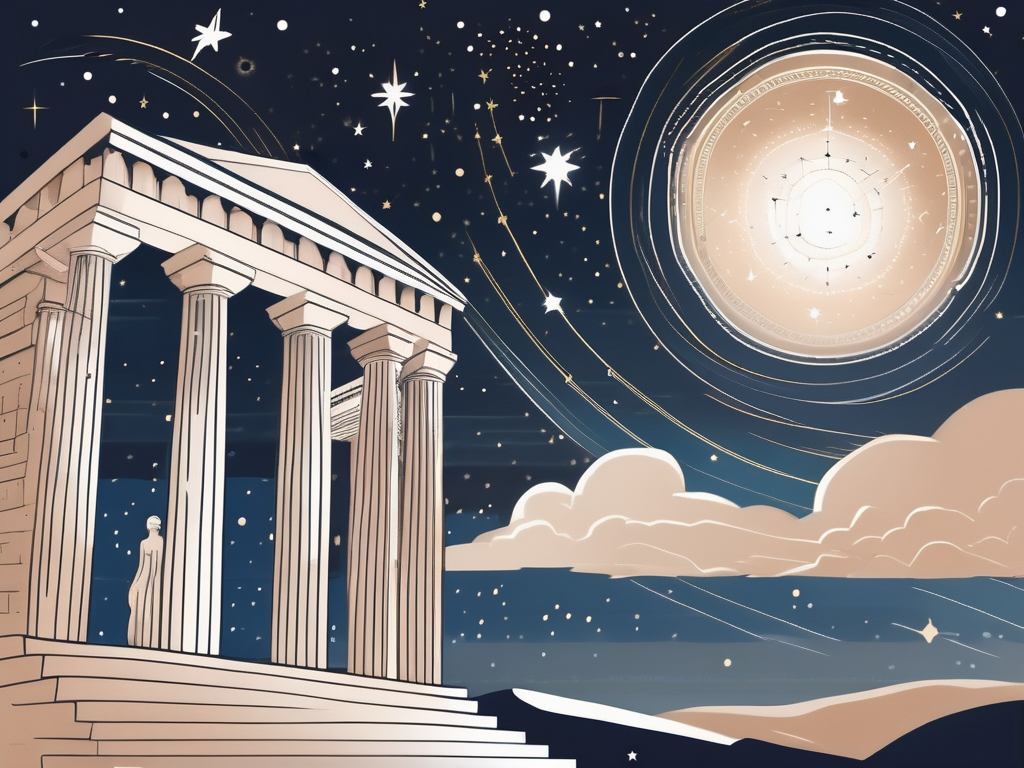The Greek mythology is a treasure trove of fascinating stories and enchanting characters. One of the most intriguing figures in this ancient pantheon is Styx, a goddess who holds considerable power and significance. In this article, we will embark on a journey to explore the story of Styx, her role in Greek mythology, her origin, symbolism, and her presence in ancient literature and modern culture.
Understanding the Role of Styx in Greek Mythology
Styx, the goddess of the river that bore her name, played a significant role in Greek mythology. She was included in the divine pantheon and was renowned for her immense powers and attributes. Let’s delve deeper and understand her place in the pantheon and the abilities she possessed.
Styx’s Place in the Pantheon
Among the countless gods and goddesses of ancient Greece, Styx held a prominent position. She was considered one of the primordial deities, born from the union of Oceanus and Tethys. Styx was revered as the goddess of the Underworld river that separated the realm of the living from the realm of the dead.
Styx’s role as the goddess of the river that connected the two realms was crucial in Greek mythology. The river itself was believed to be a physical and metaphysical boundary, marking the transition from life to death. It was said that the souls of the deceased had to cross the river Styx to enter the Underworld, where they would face their eternal fate.
As the guardian of this important passage, Styx held immense power and influence over the souls of the departed. She was both feared and respected by mortals and immortals alike, as her role in the afterlife was considered vital for maintaining order and balance in the Greek cosmos.
The Powers and Attributes of Styx
Styx possessed extraordinary powers that set her apart from other deities. Her most renowned aspect was her immortality. It is believed that she gained immortality by bathing in the river that bore her name, making her invincible and incapable of breaking her oaths. This attribute made her a vital figure in ancient Greek culture, as oaths sworn by the Styx were considered binding and irrevocable.
Legend has it that even other gods feared breaking their promises made on the sacred water of Styx. The consequences of such an act were believed to be severe and far-reaching, as the wrath of Styx could bring about catastrophic consequences. This fear of her power and the consequences of breaking oaths made Styx a revered and respected deity among the gods.
Furthermore, Styx’s immortality granted her the ability to bestow invincibility upon others. It was said that she aided Zeus during the Titanomachy, the epic battle between the Titans and the Olympians. Zeus, recognizing the importance of Styx’s support, made a solemn oath to honor her and her river, forever acknowledging her as a powerful ally.
Styx’s ability to grant invincibility made her a sought-after deity, as warriors and heroes would often seek her favor before embarking on dangerous quests or battles. It was believed that by receiving her blessing, they would become impervious to harm and have a higher chance of success.
Overall, Styx’s powers and attributes made her a formidable figure in Greek mythology. Her immortality, association with the river Styx, and ability to bestow invincibility elevated her status among the gods and mortals alike.
The Origin Story of Styx
To understand Styx and her significance fully, it is crucial to delve into her origin story. Let’s explore how she came into existence and the relationships she forged with other deities.
The Birth of Styx
Styx was born to Oceanus, the divine personification of the Earth’s ocean, and Tethys, his wife and sister. She was one of their many children, known as the Oceanids, who signified the various bodies of water in Greek mythology.
Emerging from her parent’s union, Styx became the embodiment of a mysterious river that became the boundary between the realms of the living and the deceased. This placement granted her a vital role in both mortal and immortal life.
Styx’s birth was not a mere event in the grand scheme of Greek mythology. It marked the creation of a powerful deity who would play a significant role in the lives of both gods and mortals. As the embodiment of the boundary between life and death, Styx held immense power and influence over the fate of all beings.
Her existence also symbolized the interconnectedness of the natural world and the divine realm. The union of Oceanus and Tethys, both deities associated with the Earth’s oceans, gave birth to Styx, who would become the personification of a river. This connection highlighted the belief in the harmony between nature and the gods in Greek mythology.
Styx’s Relationship with Other Deities
Styx’s connections with other deities were not limited to her immediate family. Upon her union with Pallas, Styx bore several prominent children who became significant figures in Greek mythology. These children included Zelus, Nike, Kratos, and Bia, who personified concepts such as zeal, victory, strength, and force.
The birth of Styx’s children further solidified her importance in the divine hierarchy. Each of her offspring represented essential aspects of power and influence, reflecting their mother’s own significance. Zelus embodied the fervor and dedication necessary for success, while Nike personified the triumphant spirit that accompanies victory. Kratos symbolized the strength required to overcome challenges, and Bia represented the force that drives individuals forward.
Styx’s role as a mother and the progenitor of such influential deities emphasized her position as a central figure in Greek mythology. Her children’s attributes and accomplishments were intertwined with her own, showcasing the far-reaching impact of her existence.
This familial connection reveals the interconnectedness of gods and goddesses in Greek mythology and how one figure’s presence could influence the actions and destiny of numerous others. The birth of Styx’s children not only solidified her place in the divine hierarchy but also established her as a catalyst for change and progress in the mythological world.
The Symbolism of Styx
Beyond her role in ancient Greek mythology, Styx also carried symbolic meaning that shaped the perception of various concepts. Let’s explore how Styx became a potent symbol in Greek culture.
Styx as a Symbol of Oaths and Loyalty
Styx’s immortality, linked to oaths sworn on her sacred waters, transformed her into a symbol of utmost importance. The Greeks believed that breaking an oath sworn to Styx would have severe consequences, not only in the afterlife but also in the mortal realm. Consequently, Styx became the embodiment of loyalty, trust, and honor.
This symbolism played a vital role in shaping the moral fabric of ancient Greek society, emphasizing the significance of keeping one’s word and the repercussions that would follow if trust were betrayed.
Styx in the Context of Death and the Afterlife
Beyond her association with oaths, Styx’s role as the boundary between the living and the dead also bestowed her with profound symbolism in the realm of death and the afterlife. Her river acted as a gateway, separating the land of the living from the realm inhabited by departed souls.
This connection to the afterlife brought comfort to the ancient Greeks, who believed that Styx’s presence would guide and protect them during their final journey.
Styx in Ancient Greek Literature
The mythological figure of Styx has left an indelible mark on ancient Greek literature. Let’s explore the references and allusions to Styx in some of the most celebrated works.
References to Styx in Homer’s Works
Homer, the legendary poet, made numerous mentions of Styx in his epic poems The Iliad and The Odyssey. In The Iliad, he describes the river Styx as a significant boundary between the world of the gods and the realm of mortals. Meanwhile, in The Odyssey, Homer weaves Styx into tales of heroism and great feats while emphasizing the goddess’s role in the afterlife.
Styx in Tragedies and Poems
Styx’s presence in ancient Greek literature extended beyond the works of Homer. Numerous tragedies and poems referenced the goddess, highlighting her importance and impact on the tales of gods and mortals.
These works depicted Styx as a powerful deity who invoked both awe and fear. She was often portrayed as an unyielding force, holding not only the destiny of individuals but also the fate of entire civilizations.
The Modern Interpretation of Styx
While Styx may be a figure rooted in ancient mythology, her influence continues to resonate in contemporary literature and media. Let’s explore how her legend has found a place in the modern world.
Styx in Contemporary Literature and Media
From novels to movies, contemporary writers and filmmakers have drawn inspiration from Styx’s mythology to craft captivating narratives. Styx’s association with life, death, and unbreakable oaths provides writers and filmmakers with a rich tapestry to explore profound themes and create memorable characters.
It is fascinating to see how the essence of Styx has been woven into modern storytelling, bringing her legendary status to the forefront of popular culture.
The Cultural Impact of Styx Today
While Styx may not be as well-known today as Zeus or Aphrodite, her influence can still be felt in various aspects of modern culture. From the symbolism she represents to her appearances in literature and media, Styx’s legacy endures.
Her association with loyalty, honor, and the boundary between life and death continues to resonate with individuals seeking meaning and connection in the contemporary world.
Unveiling the Mystery of Styx
In conclusion, Styx, the mythical goddess of the Greek pantheon, stands as a figure shrouded in intrigue and power. From her place in the divine pantheon to her symbolism and presence in ancient Greek literature, Styx’s story captures our imagination and invites exploration into the mysteries of ancient mythology.
Through understanding the role of Styx in Greek mythology, we gain insights into the values and beliefs of the ancient Greeks, finding connections between their world and our own.
While the gods and goddesses of the Greek pantheon may have slipped into the realm of folklore and legend, their stories and symbolism continue to enrich our lives and remind us of the enduring power of the human imagination.












